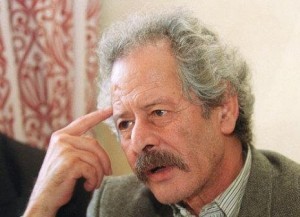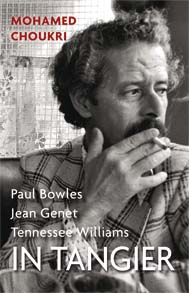Few Moroccan authors have achieved international recognition beyond the Francophone world because of the lack of translations of their works. The international acclaim of writer Mohammed Choukri and the fact that not only his works, but his remarkable life story, are known beyond the Arabic and French-speaking worlds is largely due to the support he received from globally acclaimed authors Paul Bowles and Tahar Ben Jelloun along with his own, incredible determination.
The man who was to become one of Morocco’s most well-known and controversial writers had inauspicious beginnings. He was born in 1935, in Beni Chiker (also known as Aït Chiker), a small village in Nador province, in the Rif mountains of north east Morocco, near the Algerian border. Life in such remote northern villages at this time – under the Spanish Protectorate (the French governed the area further south) – was harsh. The young Mohammed’s family was desperately poor and his father was a tyrant. Several of his siblings died of hunger, negligence or – in the case of his brother Abdelkader – murder at their father’s hands. The family moved to the cities of Tetouan and Tangier (at that time an International Zone) in search of economic security. Mohammed fled the family aged 11 to make his own life and adopted the name Choukri, a derivation of his home village.
As a child, Choukri survived on his wits. Homeless and starving, he took small jobs to get by, but resorted to theft and prostitution to survive. He used drugs and alcohol and mixed with prostitutes, beggars and street dwellers, the existence of whom most wealthy Tangerois preferred not to acknowledge. His meals often came from the garbage – he found the trash of the International Zone far more nourishing than those of his Moroccan neighbors. This grim and desperate period of his life was the inspiration for three autobiographical works, the most well-known of which is his novel, For Bread Alone. The title is a reference to the lengths he had to go to just to get dry, stale bread to eat.
At the age of 20, in an exceptional demonstration of determination and foresight, Choukri took himself off to school. In the year of Moroccan independence from France and Spain, 1956, he left Tangiers for the quieter fishing town of Larache and at 21 began primary school for the first time. He eventually finished his schooling able to write in classical Arabic (which was neither his mother tongue nor the Moroccan dialect used in daily life) and became a school teacher himself.
Back in Tangiers in the swinging 60s, he continued to document his early life, often writing in cafes and bars, where he found himself brushing shoulders with European and American literati and liberals. It was a friendship and collaboration with the US writer, Paul Bowles, which facilitated the publication of For Bread Alone in 1973 in England.
Choukri’s shocking story was out there. Although it drew explicitly on the reality of his life, it was controversial and was condemned by conservative and religious commentators in Morocco. The French translation by Tahar Ben Jelloun, a Moroccan author well-known in his own right, ensured a broader audience on its publication in 1981. Although printed in Arabic in 1982, For Bread Alone was banned in Morocco until 2000. It was as if the educated – those who could actually read his work in a country with high illiteracy – could not accept the reality of poverty in their own, newly, independent country.
Choukri published several full-length works and short stories, often printed in English before Arabic. He was still writing in the late 1990s. He died from cancer in 2003 and was buried in Tangier. In a final recognition of his contribution to Moroccan and Arabic literature, his funeral was attended by the Minister of Culture, numerous government officials, personalities and the spokesman of the King of Morocco.
During his life, Mohammed Choukri claimed that he could not put a false veneer on his work, his writing was “a protest, not a parade.” He wrote in an attempt to expose and to criticize those people and the circumstances that he felt had stolen his childhood and his teenage years. US playwright Tennessee Williams described For Bread Alone as “A true document of human desperation, shattering in its impact”.
Written by Lynn Sheppard
Lynn Sheppard has lived in Essaouira, on Morocco’s Atlantic Coast for more than 2 years, supporting local non-profits, writing and becoming an expert on all things Swiri (ie. Essaouiran). She blogs at Maroc-phile.com and for other travel industry clients.
For more information about Mohammed Choukri and Tangier
Morocco’s Imperial Cities, Seaside Resorts,Sahara Desert,Berber villages, A Taste of Morocco, Magical Kasbahs, Ruins & Waterfalls, Absolute Morocco, The Best of Marrakech, Fes, and Ouarzazate
Travel Exploration specializes in Morocco Travel. We provide Tours and travel opportunities to Morocco for the independent traveler and tailor-made tours for families and groups with a distinctly unique flavor. From Morocco’s Seven Imperial Cities, to the Magical Sahara Travel Exploration offers a captivating experience that will inspire you. At Travel Exploration we guarantee that you will discover the best of Morocco! Call Travel Exploration at 1 (800) 787-8806 or + 1 (212) 618882681 and let’s book a tour to Morocco for you today.



